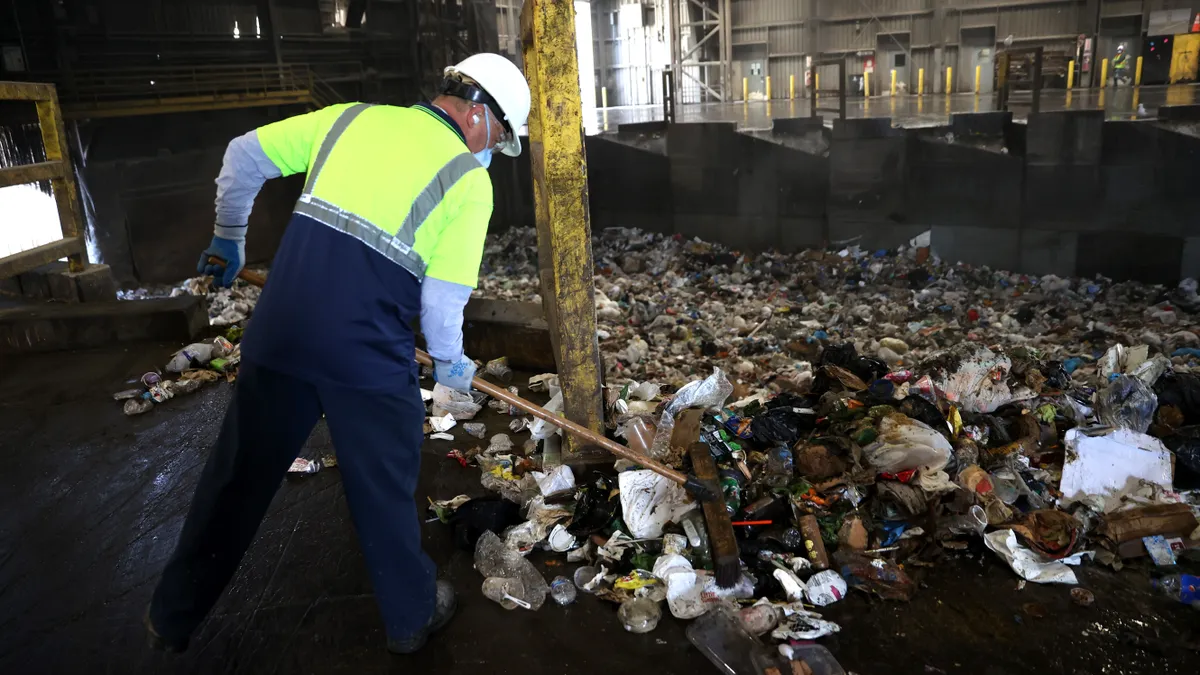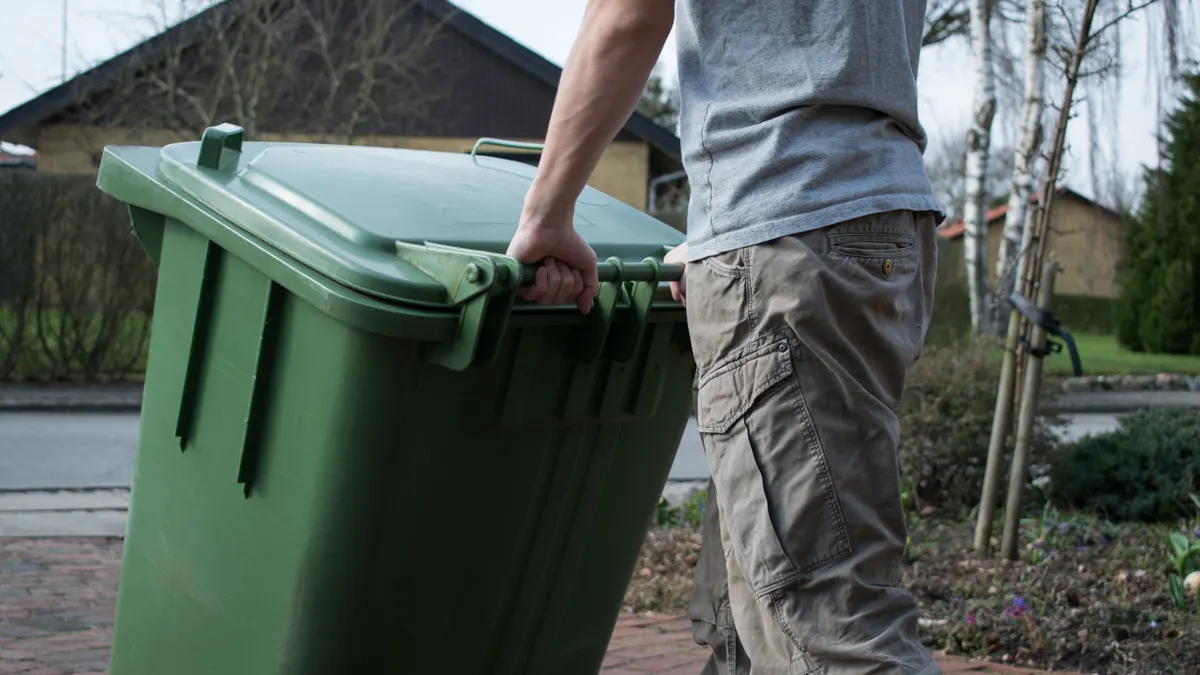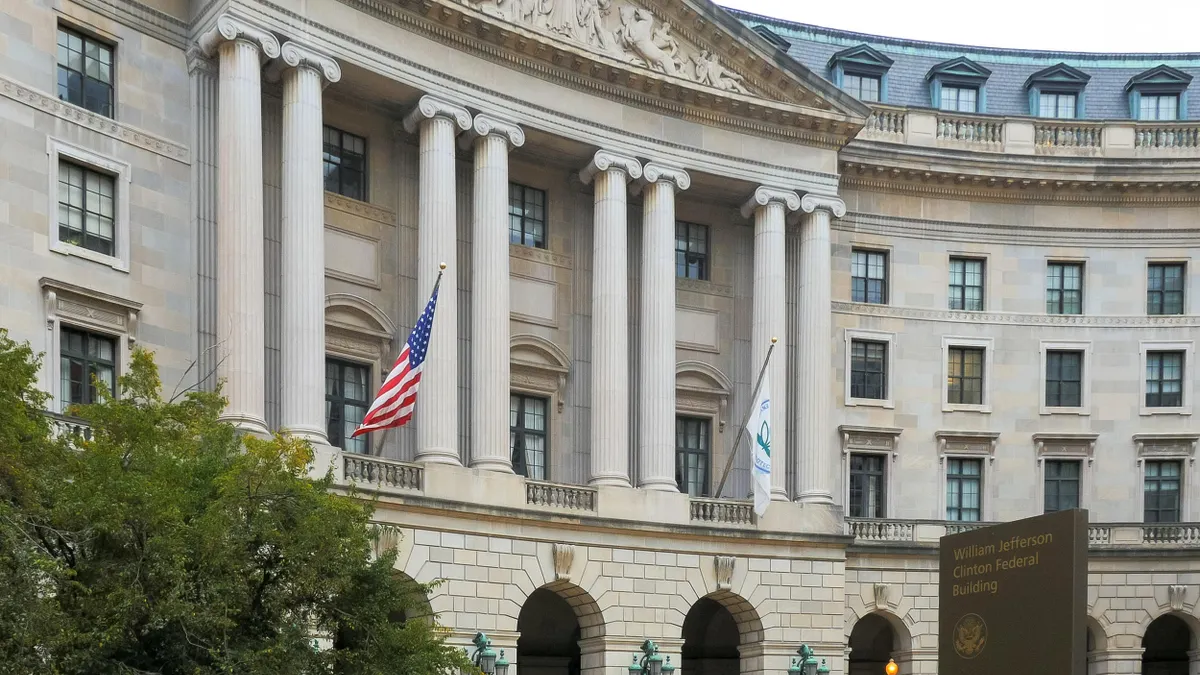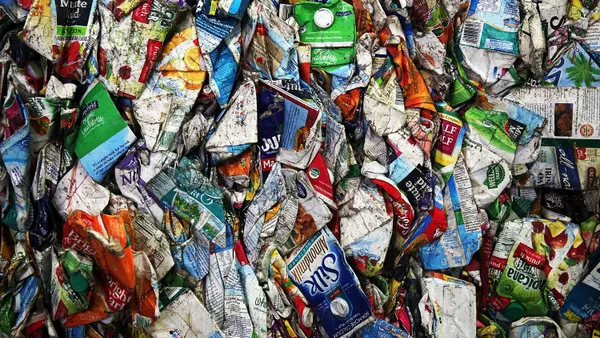Amid ongoing headlines about the impending demise of local recycling programs, some local governments are unsure of where to turn next.
It has become common to see towns, cities and counties decide to limit — or occasionally cut — recycling programs as a result of market changes in recent years. The common narrative from the waste and recycling industry's largest companies is that prices have been unrealistically low for too long — and that certain materials, such as glass, are no longer viable. This period of uncertainty has led to more engagement at the national level by companies, associations and government agencies in an effort to show progress in stabilizing the system.
Others in the space, such as the Washington, D.C.-based Institute for Local Self-Reliance (ILSR), believe the narrative portrayed by these big players is incomplete and misleading. They see local governments as having more options than they may think, given enough creativity and the right partnerships. Waste Dive recently spoke with ILSR Co-founder Neil Seldman about examples of local governments taking the lead.
The following interview has been edited for brevity and annotated for context.
WASTE DIVE: We're seeing more talk about potential federal action on recycling lately in Congress and the EPA stakeholder process, but ILSR doesn't see that as the most logical or efficient approach to fixing local programs. Why?
NEIL SELDMAN: As you know, solid waste management and recycling are the exclusive prerogative of local government. Obviously, there are state and federal rules that have to be followed. But it's at the local level where the recycling and garbage gets picked up.
At the federal level, when you call these committees or these recycling commissions, they're always dominated by the large companies ... A lot of times, grassroots groups cannot be at the meetings — they have to look at the material and then react afterwards. And if you're not at the table, you're really at a disadvantage. So therefore, we prefer local and regional solutions.
Seldman goes on to note that if and when federal discussions happen, he sees a greater role for agencies beyond the EPA. The Department of Commerce is cited as one particular example of an agency that could help fund infrastructure development for initiatives such as composting, converting single-stream recycling facilities to dual-stream — or building new MRFs entirely.
The U.S. Forest Service's support of local projects such as Camp Small in Baltimore — a site that composts trees and yard debris — is also mentioned as a prime example of a federal agency supporting "a very positive local program."
There's one other aspect of the national level activity ... I think it's terrific that the Chamber of Commerce Foundation, which of course is a private sector entity, is putting their money into the [Beyond 34 recycling program]. I'm concerned that they're going to be putting money into this and moving cities in the wrong direction.
Seldman is concerned that investment in existing single-stream recycling infrastructure, which he views as a primary culprit behind stagnant recycling rates around the country, won't be effective. He extends that critique to corporate-backed groups such as the Closed Loop Fund and The Recycling Partnership
It's good that they're making this investment, but I think they need to be guided by what the local governments need. And the local governments need to be informed by their citizens.
So in the absence of a federal recycling policy there still is national level work happening, driven by the private sector. If corporate interests are going to be nationally organized no matter what, do you think local governments really have a fair shot at advocating for themselves? Or is there a need for national discussion to combine their efforts?
SELDMAN: Well, there's always going to be a national discussion, but the cities that are standing up for themselves are going to do quite well.
Cities that want to get beyond 34% [recycling rates] don't need the Chamber of Commerce [Foundation] and don't need the EPA and don't need [others] to tell them what to do. They've got to invest in dual-stream or properly-scaled single-stream systems. They have to invest in compost and they have to ban certain non-recyclable materials, or hard-to-recycle materials, such as low grade plastic. Cities that are being very aggressive about that know exactly what their investment needs are.
Seldman cites composting as a prime example, starting with ripple effects from the closure of Delaware's Peninsula Compost in 2014. The regional processing site became overwhelmed with material, which some believe was due to mismanagement, and left many cities without alternatives for food scraps.
At the same time, citizens throughout the Mid-Atlantic were petitioning for more recycling, more composting. What has happened in the last few years is that Howard County, Maryland built its own composting system exclusively for its own materials. Prince George's County built its own facility. They built their facility for taking their own material, plus material from outside the county.
In D.C., the citizens passed a law requiring the Department of Public Works to come up with a compost plan. The city is actively looking at sites so they can implement that composting plan. At the same time, there's grassroots activity in terms of backyard composting and community-based composting. Small compost enterprises are popping up. The Baltimore Compost Collective is one of them, associated with the Filbert Street Garden. Young people go out and collect materials from households, and businesses bring it back for composting.
The exact same thing is happening in Montgomery County, Maryland, which already has an excellent yard debris composting program. Now what's on the agenda is to start getting food discards from both the private sector and the public sector.
So after the Peninsula disaster it was the cities, driven by their citizens, that have created a market for composting. Good finished compost has a year-round steady market. You don't have to worry about China, you don't have to worry about shipping this material anywhere other than within your metropolitan area. The upside of all this is after all these Mid-Atlantic jurisdictions started investing in composting, guess what's happening? The private sector is following.
Seldman cites plans for new anaerobic digestion capacity coming to the region as a sign of this movement. Pivoting to another example of local development, he highlights recent examples of cities taking steps to preserve glass recycling. While unaffected by global markets, glass has become a common target for companies and local governments to cut from recycling programs due to budget constraints. Seldman lists examples of local efforts in areas such as Virginia's Fairfax and Arlington counties, as well as Baltimore.
[The glass] companies want glass mainly because they don't have enough to manage their abilities to meet demand for the specifications of glass that they need to sell to industry — the bottle industry, the sand blast industry, the glass insulation industry. Even the construction industry, because a bed of crushed glass is great for laying down pipe and keeping it in place.
[Some] say there's no market for glass; it's not a valuable material. That's absolutely wrong. Glass is a highly valuable material — it's infinitely recyclable. It's local. And there are markets that are desperate for it.
Glass is 20% of the single-stream recycling system, so to abandon glass, you're admitting defeat, and you're not taking a highly valuable material — and one that costs a whole lot to send to a landfill or to send a processing center that doesn't recycle glass.
So the point of all this is that, clearly in composting and glass, we see the local level people driving the market ... These things aren't being discussed in the national recycling strategy.
Some state governments are more involved than others, sometimes due to regulatory structures. Where do you see them fitting in this work?
SELDMAN: I see a very good role for state governments. Several types of legislation needed have to come from the state level. Certainly container deposits. Minimum content legislation is important at the state level, and surcharges [on disposal to fund recycling].
The potential for states to drive policies such as unit pricing — sometimes referred to as pay-as-you-throw or save-as-you-throw — is also seen as beneficial. Seldman cites multiple New England states that have pursued this in the past and also offered technical assistance to local governments.
I encourage other states to take similar steps. Also, peer to peer matching could be a state-level activity. [For example,] Worcester, Massachusetts, has an excellent unit pricing program that's been doing very well. And there are other cities in the state that may want to learn from them ... The state can put the cities that are doing things right in touch with cities that want to learn.
So at the national level, you see more potential for big companies to advance their interests. That can still happen at the local level, too, if citizens aren't engaged or local governments are more aligned with recommendations from large service providers. What's the best way for a city government to educate and advocate for itself when it gets approached by these big companies that often do hold a lot of the leverage?
SELDMAN: We think it's important for cities to know the alternatives. Baltimore right now is really a wonderful test laboratory for what's going on. The citizens defeated the planned incinerator [in 2016] and now they're going after the existing incinerator, which is highly polluting. The citizens have been demanding shutting down the existing incinerator in a couple of years and having a transition program of recycling, composting and reuse.
According to Seldman, a city-funded study of long-term waste management options wasn't open to "zero waste" consultants, so local citizens have decided to back their own parallel report. ILSR is a co-author. D.C.'s publicly-driven waste policies are held up as another example.
The bottom line is that the citizens are taking their own action and putting pressure on the government to do the right thing ... So in all of these cases, it's citizen activity that is moving the city forward in the right direction.
In response to your question, what does the city do when Waste Management or [Republic Services] comes and says, "Boy, do I have a deal for you." The city needs to go to the city council. The city council knows what their grassroots constituents want, and [can] put together a plan that reflects the full needs of the city.
Correction: A previous version of this article did not specify the entity referenced is the U.S. Chamber of Commerce Foundation, not the U.S. Chamber of Commerce.



















